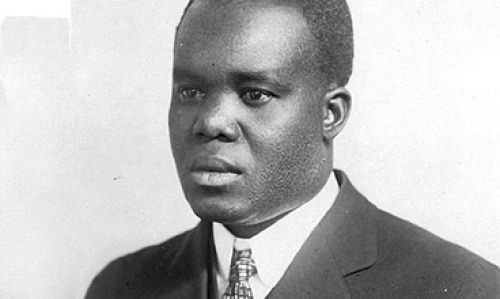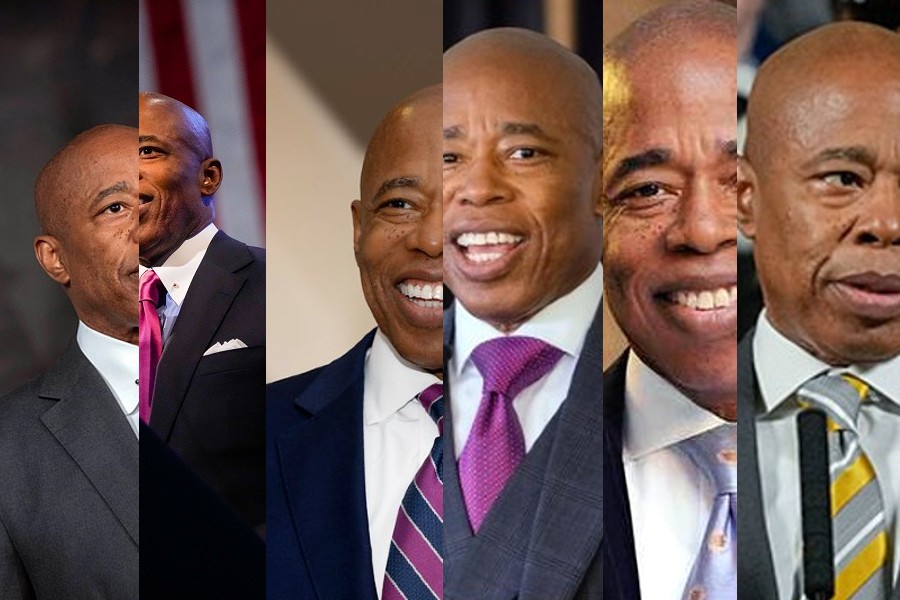Hubert Harrison (1883-1927), the “father of Harlem radicalism” and founder of the militant “New Negro Movement,” is a giant of our history. He was extremely important in his day and his significant contributions and influence are attracting increased study and discussion today. On the anniversary of his December 17, 1927, death let us all make a commitment to learn more about the important struggles that he and other waged. Let us also commit to share this knowledge with others.
Harrison was born in St. Croix, Danish West Indies, on April 27, 1883, to a laboring-class Bajan mother and a born-enslaved, plantation-laboring Crucian father. He arrived in New York as a seventeen-year-old orphan in 1900. He made his mark in the United States by struggling against class and racial oppression, by helping to create a remarkably rich and vibrant intellectual life among African Americans and by working for the enlightened development of the lives of those he affectionately referred to as “the common people.” He consistently emphasized the need for working class people to develop class-consciousness; for “Negroes” to develop race consciousness, self-reliance, and self-respect; and for all those he reached to challenge white supremacy and develop an internationalist spirit and modern, scientific, critical, and independent thought as a means toward liberation.
A self-described “radical internationalist,” Harrison was extremely well-versed in history and events in Africa, the Caribbean, Asia, the Mideast, the Americas, and Europe and he wrote voluminously and lectured indoors and out on these topics. More than any other political leader of his era, he combined class-consciousness and anti-white supremacist race consciousness in a coherent political radicalism. He opposed capitalism and imperialism and maintained that white supremacy was central to capitalist rule in the United States. He emphasized that “politically, the Negro is the touchstone of the modern democratic idea”; that “as long as the Color Line exists, all the perfumed protestations of Democracy on the part of the white race” were “downright lying” and “the cant of ‘Democracy’” was “intended as dust in the eyes of white voters”; that true democracy and equality for “Negroes” implied “a revolution . . . startling even to think of,” and that “capitalist imperialism which mercilessly exploits the darker races for its own financial purposes is the enemy which we must combine to fight.”
Working from this theoretical framework, he was active with a wide variety of movements and organizations and played signal roles in the development of what were, up to that time, the largest class radical movement (socialism) and the largest race radical movement (the “New Negro”/Garvey movement) in U.S. history. His ideas on the centrality of the struggle against white supremacy anticipated the profound transformative power of the Civil Rights/Black Liberation struggles of the 1960s and his thoughts on “democracy in America” offer penetrating insights on the limitations and potential of America in the twenty-first century.
Harrison served as the foremost Black organizer, agitator, and theoretician in the Socialist Party of New York during its 1912 heyday; he founded the first organization (the Liberty League) and the first newspaper (The Voice) of the militant, World War I-era “New Negro” movement; edited The New Negro: A Monthly Magazine of a Different Sort (“intended as an organ of the international consciousness of the darker races — especially of the Negro race”) in 1919; wrote When Africa Awakes: The “Inside Story” of the Stirrings and Strivings of the New Negro in the Western World'” in 1920; and he served as the editor of the Negro World and principal radical influence on the Garvey movement during its radical high point in 1920.
His views on race and class profoundly influenced a generation of “New Negro” militants including the class radical Randolph and the race radical Garvey. Considered more race conscious than Randolph and more class conscious than Garvey, Harrison is the key link in the ideological unity of the two great trends of the Black Liberation Movement — the labor and civil rights trend associated with Martin Luther King, Jr., and the race and nationalist trend associated with Malcolm X. (Randolph and Garvey were, respectively, the direct links to King marching on Washington, with Randolph at his side, and to Malcolm (whose father was a Garveyite preacher and whose mother wrote for the Negro World), speaking militantly and proudly on street corners in Harlem.
Harrison was not only a political radical, however. Rogers described him as an “Intellectual Giant and Free-Lance Educator,” whose contributions were wide-ranging, innovative, and influential. He was an immensely skilled self-educated lecturer (for the New York City Board of Education) who spoke and/or read six languages; a highly praised journalist, critic, and book reviewer (who reportedly started “the first regular book-review section known to Negro newspaperdom”); a pioneer Black activist in the freethought and birth control movements; and a bibliophile and library builder and popularizer who was an officer of the committee that helped develop the 135th Street Public Library into what has become known as the internationally famous Schomburg Center for Research in Black Culture.
Hubert Harrison was truly extraordinary and people are encouraged to learn about and discuss his life and work and to Keep Alive the Struggles and Memory of this Giant of Black History.
Jeffrey B. Perry is an independent, working class scholar who was formally educated at Princeton, Harvard, Rutgers, and Columbia University. He was a long-time rank-and-file activist, elected union officer with Local 300, and editor for the National Postal Mail Handlers Union (div. of LIUNA, AFL-CIO). Dr. Perry preserved and inventoried the Hubert H. Harrison Papers (now at Columbia University’s Rare Book and Manuscript Library) and is the editor of A Hubert Harrison Reader (Wesleyan University Press, 2001) and Harrison’s When Africa Awakes: The “Inside Story” of the Stirrings and Striving of the New Negro in the Western World (Diasporic Africa Press, 2014) and he is the author of Hubert Harrison: The Voice of Harlem Radicalism, 1883-1918 (Columbia University Press, 2008). He is currently working on volume two of the Hubert Harrison biography and editing Harrison’s writings for placement on Columbia University’s Rare Book and Manuscript Library webpage.http://www.jeffreybperry.net
Become a Harlem Insider!
By submitting this form, you are consenting to receive marketing emails from: . You can revoke your consent to receive emails at any time by using the SafeUnsubscribe® link, found at the bottom of every email. Emails are serviced by Constant Contact









